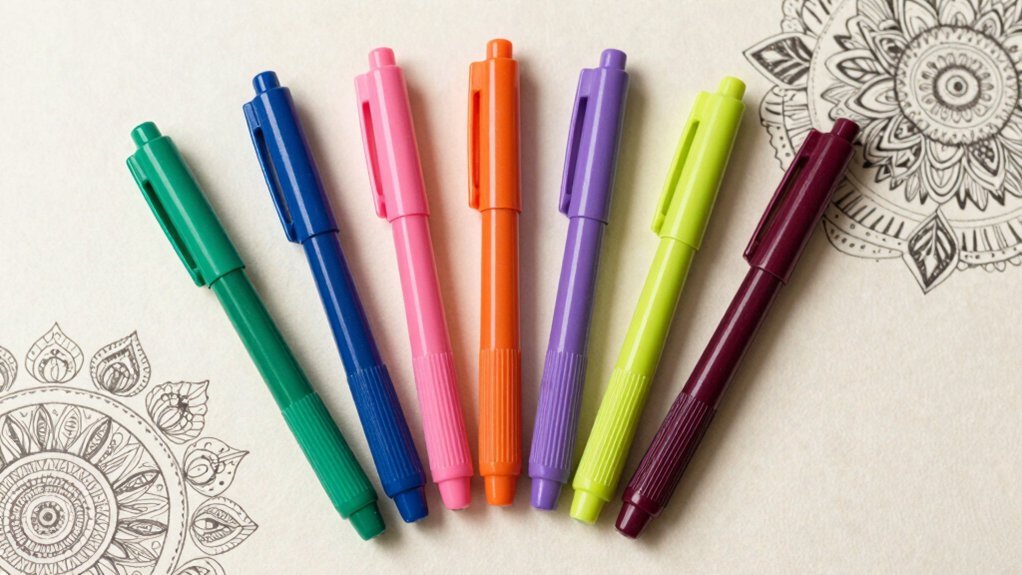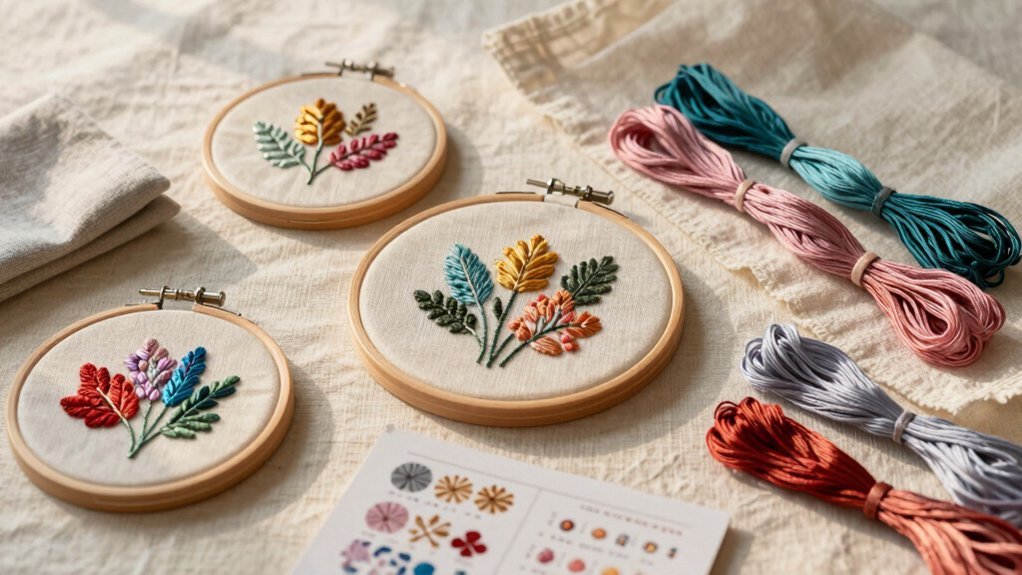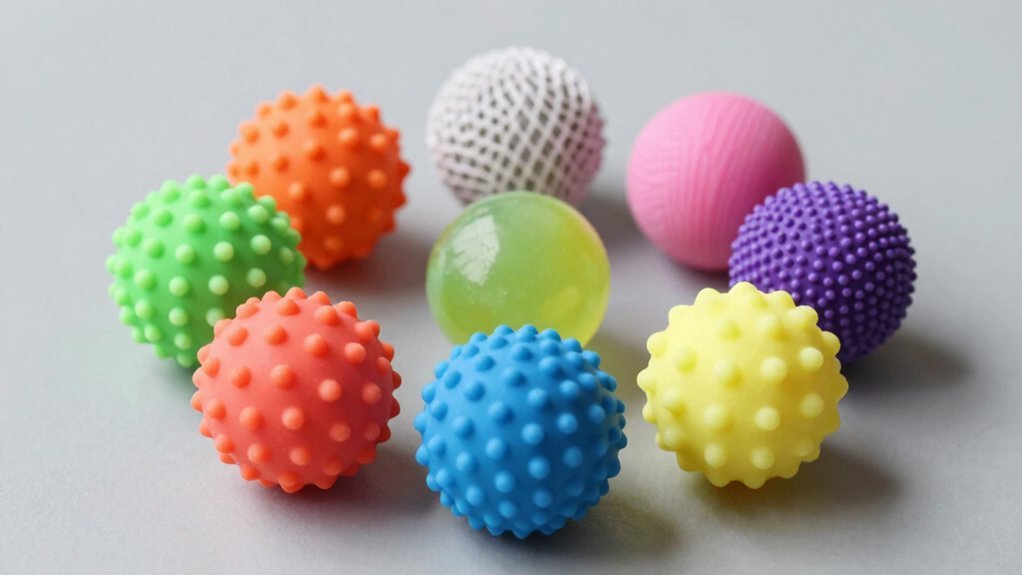Old hobbies offer you a perfect blend of solitary engagement and gentle social connection to ease your anxiety. You can find peace in restoring vintage postcards, knitting with heritage patterns, or carefully bringing antique books back to life. Traditional woodworking and collecting retro board games let you work at your own pace while building confidence. The methodical care of vinyl records, creation of heirloom quilts, and exploration of historic recipes provide meditative escapes from social pressure. Cultivating an old-fashioned garden creates a tranquil space for reflection. These time-honored pursuits hold countless ways to nurture your well-being and personal growth.
Restoring Vintage Postcards

Diving into vintage postcard restoration offers a peaceful retreat from social pressures while preserving pieces of history.
You'll find that this detail-oriented hobby demands focused attention, naturally drawing your mind away from social worries and anxiety-inducing thoughts.
To begin, you'll need basic supplies: acid-free cleaning materials, archival-quality storage sleeves, cotton swabs, and a soft brush.
Start by gently cleaning each postcard using appropriate techniques based on its age and condition. You can remove surface dirt with a soft brush, carefully address stains, and repair minor tears with archival tape.
The process becomes meditative as you work alone, examining intricate details of postcards from different eras.
You'll discover fascinating glimpses of the past through postmarks, handwritten messages, and historical imagery.
Creating a digital archive of your restored pieces adds another layer to this solitary pursuit.
You can join online restoration communities where you'll interact with fellow enthusiasts at your own pace.
These virtual connections let you share techniques and discoveries without the pressure of face-to-face interactions, making it an ideal hobby for managing social anxiety.
Knitting With Heritage Patterns
Moving from preserving paper memories to crafting with yarn, knitting with heritage patterns offers another soothing way to connect with the past while managing social anxiety.
You'll find that working with decades-old patterns from the Victorian era through the 1950s creates a meditative experience that quiets anxious thoughts and focuses your mind on precise, repetitive motions.
Start with simple heritage patterns like basic shawls or baby booties that use traditional stitches. You can find these patterns in digitized vintage knitting books, antique pattern leaflets, or museum archives.
The rhythmic clicking of needles and the satisfaction of recreating historical designs help ground you in the present moment while linking you to generations of knitters before you.
When you're ready, join online vintage knitting communities where you can share progress photos and ask questions without face-to-face interaction.
These groups often provide pattern translations from old terminology to modern knitting language. You'll develop confidence as you master intricate vintage techniques like Turkish cast-ons or Norwegian purl stitches, all while maintaining control over your social interactions and anxiety levels.
Antique Book Restoration

Your hands stay busy and your mind finds peace as you carefully repair aging spines and mend torn pages in the quiet solitude of antique book restoration.
You'll discover a meditative rhythm while working alone on detailed restoration projects, giving your anxious thoughts a chance to settle.
While it's primarily a solitary pursuit, you can connect with other bibliophiles through restoration workshops and online forums when you're ready to share your finished pieces.
Focused Solo Creative Time
Several creative solitary pursuits can help manage social anxiety, but antique book restoration stands out as a uniquely absorbing craft. When you're working on a damaged book, you'll find yourself completely immersed in the delicate process of breathing new life into aged pages and worn bindings.
The methodical nature of book restoration demands your full attention, leaving little room for anxious thoughts. You'll develop a deep appreciation for craftsmanship as you work with traditional tools and techniques. Each project offers a chance to practice patience while strengthening your focus on the present moment.
- Cleaning and repairing individual pages requires steady hands and careful concentration, creating a natural state of mindfulness.
- The slow, deliberate process of re-sewing book signatures helps quiet racing thoughts.
- Working with leather, cloth, and paper engages multiple senses, grounding you in the physical world.
- Completing a restoration project builds confidence through tangible accomplishments.
This centuries-old craft provides a perfect balance of technical skill and artistic expression, making it an ideal hobby for managing anxiety while preserving literary treasures.
Building Community Through Books
Despite its solitary nature, antique book restoration can forge meaningful connections within specialized communities. When you join restoration groups or online forums, you'll find fellow enthusiasts who share your passion for preserving literary history. These communities often exchange techniques, source materials, and solve complex restoration challenges together.
You can start by attending workshops at local bookbinding societies or conservation centers, where you'll meet mentors and peers who understand the meditative appeal of working with aged paper and leather. As your skills develop, you'll discover that book restoration creates natural conversation topics, allowing you to interact with others through a shared interest rather than forced small talk.
The antiquarian book world welcomes careful, detail-oriented individuals, and you'll find that many fellow restorers share similar temperaments. You can participate in book fairs, conservation exhibits, or library preservation projects at your own comfort level.
Through these activities, you'll build relationships gradually and authentically, centered around your craft rather than social expectations. The structured nature of restoration work provides clear talking points, making social interactions feel more purposeful and less anxiety-inducing.
Traditional Woodworking
Traditional woodworking offers a meditative escape for those battling social anxiety. When you work with wood, your mind focuses solely on the task at hand, creating a natural barrier against anxious thoughts. The rhythmic motions of planing, sanding, and carving help ground you in the present moment, much like mindfulness practices.
You'll find that traditional woodworking emphasizes hand tools over power tools, which creates a more peaceful, controlled environment. The quiet nature of using chisels, planes, and hand saws allows you to work without the jarring noise that often triggers anxiety.
As you develop your skills, you'll notice how each project builds your confidence through tangible accomplishments.
- Creating functional items like boxes, tables, or spoons gives you a sense of purpose and achievement
- The slow, deliberate nature of hand tool work naturally reduces stress and racing thoughts
- Working with natural materials connects you to age-old traditions and provides a screen-free activity
- You can practice alone in your workspace, progressing at your own pace without social pressure
This craft lets you express yourself creatively while maintaining complete control over your environment and engagement level.
Collecting Retro Board Games

The nostalgic pursuit of collecting retro board games provides a comforting retreat for those with social anxiety. You'll find that browsing thrift stores, flea markets, and online marketplaces for vintage games creates a sense of purpose without the pressure of intense social interaction.
Classic titles from the 1960s through 1990s often carry emotional connections to simpler times, helping ease anxiety through familiar associations. You can start your collection with well-known classics like original versions of Monopoly, Scrabble, or Risk.
As you become more confident, you might explore niche games from specific decades or focus on particular manufacturers like Milton Bradley or Parker Brothers. The restoration process of old game boards and pieces offers a meditative experience, from cleaning components to organizing cards and tokens.
This hobby also provides opportunities for controlled social interaction when you're ready. You can join online collecting communities, trade with other enthusiasts through the mail, or display your collection on social media.
The beauty of retro board game collecting lies in its flexibility – you can engage with others at your own pace while building a meaningful collection.
Letter Writing Revival
When you're struggling with social anxiety, picking up a pen and writing letters can be a powerful way to process your inner fears without the pressure of face-to-face interaction.
You'll find that letter writing provides a slow, mindful way to connect with others while maintaining control over your social interactions.
As you craft each thoughtful message, you're building confidence in expressing yourself clearly and authentically, one carefully chosen word at a time.
Writing Heals Inner Fears
Picking up a pen to write letters might seem outdated in our digital age, but letter writing offers powerful therapeutic benefits for those battling social anxiety. When you write letters, you're creating a safe space to express your thoughts without the immediate pressure of face-to-face interactions.
Writing letters helps you process your anxious feelings by:
- Allowing you to pause, reflect, and carefully choose your words without the stress of immediate responses
- Creating a sense of control over your communication, reducing the fear of being judged
- Helping you practice social interactions at your own pace, building confidence gradually
- Providing a tangible outlet for expressing emotions that might feel overwhelming in person
Through letter writing, you'll discover that confronting social fears becomes more manageable. The physical act of writing engages different parts of your brain, helping you work through complex emotions while maintaining a comfortable distance.
You'll find that regularly putting pen to paper strengthens your ability to articulate thoughts clearly, making future social interactions less intimidating. This old-fashioned hobby serves as a bridge between isolation and connection, giving you the tools to heal at your own pace.
Slow-Paced Social Connection
Building on the healing power of letter writing, reconnecting with others through handwritten correspondence offers a gentle pathway to stronger social bonds.
You'll find that letter writing lets you engage socially at your own pace, without the immediate pressure of face-to-face interactions or digital messaging's constant demands.
Start by writing to a trusted friend or family member who'll appreciate the personal touch. Share your thoughts, experiences, and feelings on paper, knowing you can take time to carefully choose your words.
The physical act of writing creates natural pauses for reflection, helping you communicate more authentically than you might in spontaneous conversations.
As you exchange letters, you're building meaningful connections while practicing social skills in a low-stress environment. Each response you receive provides an opportunity to process social interactions gradually, without the anxiety of real-time reactions.
You can even join letter-writing clubs or find pen pals who share your interests, expanding your social circle at a comfortable pace.
This traditional practice helps you develop confidence in expressing yourself while creating lasting memories through tangible keepsakes of your growing relationships.
Thoughtful Words Build Confidence
The art of composing thoughtful letters nurtures self-confidence through deliberate self-expression. When you write letters, you'll find space to carefully choose your words and develop your authentic voice without the pressure of immediate responses. This mindful approach to communication helps you overcome social anxiety by letting you process thoughts at your own pace.
Letter writing offers unique benefits for building social confidence:
- You can take time to reflect on your emotions and experiences before sharing them, reducing the anxiety of spontaneous interactions.
- Each letter serves as practice for expressing yourself clearly, a skill that transfers to face-to-face conversations.
- Writing by hand engages your mind differently than typing, helping you stay present and focused on your thoughts.
- The physical act of sending and receiving letters creates meaningful connections without overwhelming social pressure.
Start by writing to close friends or family members who'll appreciate your effort. As you develop comfort with written expression, you'll notice increased confidence in other social situations. Your carefully crafted words become stepping stones toward stronger interpersonal connections and reduced anxiety in daily interactions.
Classic Jigsaw Puzzles

Classic jigsaw puzzles offer a perfect solo activity that lets you escape social pressures while keeping your mind engaged. When you're feeling overwhelmed by social situations, sitting down with a 500 or 1000-piece puzzle can provide immediate relief and a sense of control over your environment.
Working on puzzles strengthens your problem-solving abilities without the stress of social interaction. You'll discover that matching colors, patterns, and shapes requires focused attention, naturally drawing your mind away from anxiety-producing thoughts.
The methodical process of sorting edge pieces, building the frame, and filling in sections creates a predictable structure that's both calming and rewarding.
You don't need special skills or equipment – just a flat surface and good lighting. Start with smaller puzzles to build confidence, then progress to more challenging ones. You'll find that completing each puzzle delivers a sense of achievement that can boost your self-esteem.
Many puzzle enthusiasts also report that the repetitive nature of finding and fitting pieces triggers a meditative state, reducing overall anxiety levels. Consider displaying finished puzzles or breaking them down immediately – there's no pressure to follow anyone else's rules.
Vinyl Record Care
Taking care of vinyl records can be a calming ritual that helps you focus on something tangible while managing social anxiety.
You'll need specialized cleaning tools like a carbon fiber brush and cleaning solution to remove dust and debris that can affect sound quality.
Storing your records vertically in protective sleeves and maintaining stable room temperature will prevent warping and extend the life of your collection.
Clean With Proper Tools
Proper cleaning tools make all the difference when maintaining your vinyl records for long-term enjoyment.
You'll need specialized equipment to remove dust, static, and debris without damaging the delicate grooves that produce your music. While it might seem tempting to use household items, investing in the right cleaning tools will protect your collection and preserve sound quality.
- A carbon fiber brush remains essential for removing surface dust before and after playing your records, helping prevent microscopic particles from becoming embedded.
- An anti-static gun neutralizes electrical charges that attract dust particles, making your cleaning routine more effective and reducing unwanted pops and crackles.
- A velvet brush with cleaning solution helps remove stubborn dirt and fingerprints, reaching deep into the grooves without leaving residue.
- A microfiber cloth serves as your final step, gently wiping away any remaining moisture or particles.
Don't forget to clean your cleaning tools regularly too.
Store them in dust-free containers and replace them when they show signs of wear.
With proper maintenance of both your records and cleaning equipment, you'll enjoy crystal-clear playback for years to come.
Mindful Storage Prevents Damage
Your vinyl records' longevity depends heavily on how you store them. Keep them in high-quality inner sleeves made of anti-static materials, and replace any worn-out or paper sleeves that can scratch your records.
Always store albums vertically, never stacked horizontally, as the weight can warp the vinyl over time. Maintain a consistent storage environment with temperatures between 65-70°F and humidity levels around 45-50%. Avoid placing records near heat sources, windows, or areas prone to temperature fluctuations.
Use sturdy, properly sized record shelves or cabinets that support the entire album cover and prevent sagging. Don't pack records too tightly together on shelves – you'll need to slide them in and out easily without causing friction.
When storing multiple records, use high-quality dividers to keep them organized and prevent them from leaning at angles. Store similar-sized records together, and consider using outer plastic sleeves for rare or valuable albums to protect the covers from shelf wear and dust.
Remove records from their sleeves by bowing the sleeve slightly and gently sliding the vinyl out to prevent scratches.
Heirloom Quilt Making

A treasured quilt passed down through generations can tell stories without words. When you're struggling with social anxiety, creating an heirloom quilt offers a peaceful, meditative escape while producing something meaningful for your family's future.
You'll find that the repetitive nature of quilting helps calm racing thoughts and provides a sense of accomplishment.
Start your quilting journey by selecting fabrics that hold special meaning. You might choose:
- Pieces from outgrown baby clothes or cherished garments
- Swatches from important life events, like wedding attire or graduation gowns
- Fabrics that remind you of loved ones or special places
- Materials in colors that evoke positive memories or emotions
As you work on your quilt, you're creating more than just a blanket – you're crafting a legacy.
The methodical process of cutting, arranging, and stitching pieces together allows you to focus on the present moment rather than social worries.
You'll discover that quilting provides a natural conversation starter when you're ready to connect with others, as fellow crafters often share tips and appreciate the artistry involved in handmade quilts.
Historic Recipe Collection
Like quilts that tell family stories, cherished recipes connect us to our heritage while offering a gentle way to manage social anxiety. When you feel overwhelmed by social interactions, diving into historic recipe collection lets you explore your family's past at your own pace, without the pressure of immediate social engagement.
Start by gathering old recipe cards from relatives, focusing on dishes that span generations. You'll find that many grandparents and great-aunts kept handwritten notes describing traditional meals, complete with margin notes and cooking secrets. Scan these treasures to preserve them, then organize them by era, occasion, or family member.
You can expand your collection beyond family by researching regional cookbooks from different decades, discovering how local ingredients and cooking methods evolved. Create a digital or physical archive, adding historical context about the times when these dishes were popular.
When you're ready for gentle social interaction, you'll have fascinating conversation topics about food history, family traditions, and cultural heritage. You can even test these recipes alone first, building confidence before sharing them at small gatherings when you feel comfortable.
Old-Fashioned Gardening Methods

Traditional garden plots, tended with time-tested methods, offer a peaceful sanctuary for those managing social anxiety. You'll find solace in working with heirloom seeds and implementing techniques your grandparents might've used, like companion planting and natural pest control.
These classic gardening approaches don't require social interaction but deliver profound satisfaction. You can practice crop rotation, build compost heaps, and create your own organic fertilizers using household scraps. The methodical nature of old-school gardening provides structure while allowing your mind to focus on tangible tasks rather than social worries.
- Hand-tilling soil with basic tools like spades and hoes creates a meditative rhythm that calms anxious thoughts.
- Moon-phase planting connects you to ancient agricultural wisdom and natural cycles.
- Creating DIY trellises from found materials like branches and twine engages creative problem-solving.
- Saving seeds from year to year builds self-reliance and reduces dependency on store interactions.
Frequently Asked Questions
How Much Money Should Beginners Budget for Starting an Old-Fashioned Hobby?
You'll want to set aside $50-150 initially for basic supplies in most traditional hobbies. Start small with essentials like knitting needles, gardening tools, or art supplies, then expand your collection as you develop skills.
Can Old Hobbies Help Develop Professional Networking Skills?
You'll gain valuable networking skills through traditional hobbies like book clubs, knitting circles, or woodworking groups. These activities let you practice small talk and build connections while sharing common interests with professionals.
Which Traditional Hobbies Are Best for Meeting People Over Age 50?
You'll find great connections through book clubs, gardening groups, craft circles, and local history societies. Bridge clubs, dancing classes, and volunteer organizations also attract many active seniors who're enthusiastic to meet others.
Do These Hobbies Require Special Insurance or Liability Coverage?
You'll find most social hobbies don't require special insurance. However, if you're organizing group activities or hosting events at your home, it's wise to check with your homeowner's insurance for liability coverage.
Are There Online Communities Specifically for People Practicing Vintage Hobbies?
You'll find dedicated online groups for vintage crafts on platforms like Reddit, Etsy, and Facebook. There's thriving communities for knitting, letterwriting, quilting, model-building, and stamp collecting where you can connect with fellow enthusiasts.
In Summary
Whether you're piecing together an heirloom quilt or restoring vintage postcards, these timeless hobbies offer a gentle path to managing social anxiety. You'll find that working with your hands provides both solitude when you need it and natural conversation starters when you're ready to connect. By focusing on these old-world crafts, you're creating a bridge between peaceful solitary moments and meaningful social interactions at your own pace.





Leave a Reply